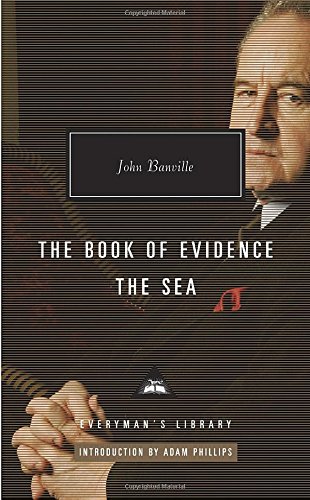Book Review: The Book of Evidence/The Sea by John Banville
Confessions of Things Past
 In the Introduction of the new Everyman's Library volume of John Banville's novels, The Book of Evidence and The Sea, Adam Phillips writes, "The drama of these novels...is the drama of self exposure." In both fictions, the narrators confess their past and in so doing explicate the existential morass in which they seem to be mired. Whether Banville's protagonists are absolved in the end is ultimately a judgement for the omniscient reader.
In the Introduction of the new Everyman's Library volume of John Banville's novels, The Book of Evidence and The Sea, Adam Phillips writes, "The drama of these novels...is the drama of self exposure." In both fictions, the narrators confess their past and in so doing explicate the existential morass in which they seem to be mired. Whether Banville's protagonists are absolved in the end is ultimately a judgement for the omniscient reader.
In the earlier work, The Book of Evidence (perhaps a fitting title for any of Banville's subsequent novels), Freddie Montgomery, a character based on the convicted murderer Malcolm Edward MacArthur, addresses his confession from his jail cell to his soon-to-be judge and jury-- a written testimony of his alleged crime. Although the reader has no reason not to believe him, Freddie is, nonetheless, an unreliable narrator. But it's not until the ambivalent last line of the document that the reader feels free from any postulation and is reminded that ultimately, remorse is all that matters.
In The Sea, a man, still mourning the death of his wife, returns to a seaside resort where he recounts his childhood experiences there. Max Morden (a name evoking both death and irony) remembers his encounters with the Graces, a family who had leased the large summer house called The Cedars, nearby to the cheaper rental bungalows of his parent's means. Soon young Max is smitten with the buxom and vibrant Mrs. Grace, Connie, in her wet bathing suit as she plays ball with the children:
"I cannot take my eyes off the tight black bulge at the upside down apex of her lap..." he admits, but he is justly concerned for her. "Her breasts bounce. The sight of her is almost alarming. A creature with so many mounds and scoops of flesh to carry should not cavort like this, she will damage something inside her, some tender arrangement of adipose tissue and pearly cartilage."
But Max, his bildungsroman bursting at the crotch, finds some solace in the acquaintance of the Grace children: sulky, but intrepid Chloe and her younger brother the mute and web-toed Myles. Watching over them all is Rose, an au pair, very young and impressionable herself. Into this Proustian portrayal, Banville, beyond the typical nostalgia, pathos, and humor manages to inject a heaping dose of suspense and surprise, even if the final reveal is predictable. In the capable hands of this author, however, no minor flaw is a deal breaker. At length, Banville delivers the promised payload to his readers, eliciting, I would suspect, a kind of plaintive contentment.
Published together in this handsome (as always) Everyman's Library volume, The Book of Evidence and The Sea comprise an exemplary introduction to the world of John Banville; there is: mystery, crime, confessional narrative, intrigue, sentiment without being sentimental, and revelation. Featuring an adroit narrative tone, considerate of one's intelligence, Banville is a welcome voice to come home to each evening, particularly after you've been pounded over the head with the trivial inanities of everyday existence.
~ 4.9 Stars
In The Sea, a man, still mourning the death of his wife, returns to a seaside resort where he recounts his childhood experiences there. Max Morden (a name evoking both death and irony) remembers his encounters with the Graces, a family who had leased the large summer house called The Cedars, nearby to the cheaper rental bungalows of his parent's means. Soon young Max is smitten with the buxom and vibrant Mrs. Grace, Connie, in her wet bathing suit as she plays ball with the children:
"I cannot take my eyes off the tight black bulge at the upside down apex of her lap..." he admits, but he is justly concerned for her. "Her breasts bounce. The sight of her is almost alarming. A creature with so many mounds and scoops of flesh to carry should not cavort like this, she will damage something inside her, some tender arrangement of adipose tissue and pearly cartilage."
But Max, his bildungsroman bursting at the crotch, finds some solace in the acquaintance of the Grace children: sulky, but intrepid Chloe and her younger brother the mute and web-toed Myles. Watching over them all is Rose, an au pair, very young and impressionable herself. Into this Proustian portrayal, Banville, beyond the typical nostalgia, pathos, and humor manages to inject a heaping dose of suspense and surprise, even if the final reveal is predictable. In the capable hands of this author, however, no minor flaw is a deal breaker. At length, Banville delivers the promised payload to his readers, eliciting, I would suspect, a kind of plaintive contentment.
Published together in this handsome (as always) Everyman's Library volume, The Book of Evidence and The Sea comprise an exemplary introduction to the world of John Banville; there is: mystery, crime, confessional narrative, intrigue, sentiment without being sentimental, and revelation. Featuring an adroit narrative tone, considerate of one's intelligence, Banville is a welcome voice to come home to each evening, particularly after you've been pounded over the head with the trivial inanities of everyday existence.
~ 4.9 Stars
Comments
Post a Comment